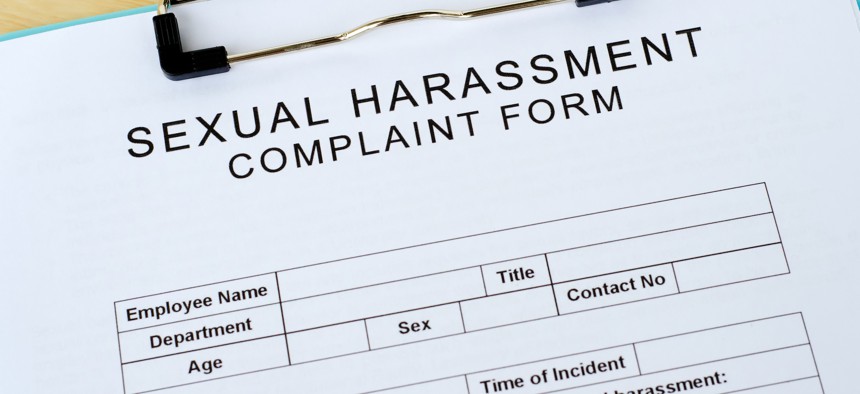
FDIC Chairman Martin Gruenberg announced his intent to resign after an independent report found the agency was rife with sexual harassment. Nora Carol Photography / Getty Images
FDIC leaders let anti-harassment initiatives falter
A recent inspector general report is the latest investigation into shortcomings with the banking regulator’s sexual harassment prevention programs and policies.
The Federal Deposit Insurance Corporation still has not implemented an effective sexual harassment prevention program, according to a report issued by its inspector general on Wednesday. The investigation’s findings further cement concerns about how the banking regulator has addressed widespread harassment problems at the agency, which have already prompted its chairman to announce his intent to resign.
FDIC’s Office of Inspector General in 2020 issued a report that found the agency had not created an adequate sexual harassment prevention program and made recommendations to improve reporting and handling of sexual harassment allegations. In response, the banking regulator established an oversight plan for its anti-harassment program, and the OIG in 2021 considered the recommendations closed and fulfilled.
In the report published by the OIG on Wednesday, however, investigators found that the FDIC has not sustained many of the improvements that were implemented following the 2020 report.
“The weaknesses we identified in the FDIC’s [anti-harassment program] occurred as a result of a lack of attention and action by FDIC leadership in assessing and improving the program, and a failure to sustain prior OIG recommendations,” investigators wrote. “As a result, the FDIC is experiencing an environment of distrust, and many employees do not feel comfortable reporting sexual harassment at the FDIC.”
Some examples of FDIC policies in which the OIG found shortcomings include:
- An anti-harassment directive provides the FDIC’s anti-harassment program coordinator with significant oversight responsibilities, but does not give them the authority to mandate other agency divisions to comply with the directive or outline a process for the official to raise harassment issues directly with senior managers.
- FDIC contracted with a third party for a harassment complaint management tracking system following the release of the 2020 OIG report, but it terminated the contract due to difficulties using the system. Then, the agency created its own tracking tool, but investigators found it did not include relevant data fields and contained inaccurate information.
- Procedures for offices conducting harassment investigations lack certain key information, including how to notify alleged victims of their rights, when a conflict of interest needs to be addressed and where to store digital case files. In fact, some specialists were keeping case file information on their hard drives, which means that if they leave their positions some records from the case could disappear.
In an OIG survey of FDIC’s employees about their experiences with sexual harassment between April 20, 2019, and Jan. 19, 2024, out of 2,812 respondents, 191, or 7%, said they were harassed at FDIC. However the agency told investigators that it had only received 34 allegations since April 2019, suggesting an underreporting.
Additionally, 49% of individuals who experienced sexual harassment and 51% of employees who witnessed it said they did not report it over fears of retaliation, which are increases from a similar survey that was part of the 2020 OIG report.
The OIG made 24 recommendations, including that FDIC leadership: provide appropriate authorities to the anti-harassment program coordinator for holding supervisors accountable if they fail any harassment-related supervisory responsibility; ensure the agency maintains an accurate and complete record of sexual harassment misconduct allegations; update and implement investigation standard operating procedures.
FDIC concurred with all of the recommendations. In a letter accompanying the report, Daniel H. Bendler, deputy to the agency’s chairman and chief operating officer, pointed out some anti-harassment initiatives the agency has already undertaken, such as establishing a hotline for employees to report harassment and providing in-person training to every employee on how to prevent, recognize and report sexual harassment.
These initiatives are part of the FDIC’s action plan, which it issued in December 2023 after The Wall Street Journal the previous month published a report on the agency’s “toxic atmosphere.”
However FDIC employees told OIG investigators that some of the individuals directing or working on the action plan have, or had, sexual harassment or retaliation allegations made against them.
An independent report in May determined that the FDIC was rife with “sexual harassment, discrimination and other interpersonal misconduct.” Shortly thereafter, Chairman Martin Gruenberg said he would step down after a successor is appointed.
The next month President Joe Biden announced that he would nominate Christy Goldsmith Romero, who currently is a commissioner at the Commodity Futures Trading Commission, as chair of the regulator.
In her July confirmation hearing, Romero said she would “prioritize a complete overhaul of the FDIC’s workplace culture.”
“The reporting is deeply disturbing and describes deep seated cultural issues that have caused pain for many employees,” she said. “It must not continue and I will bring accountability.”







